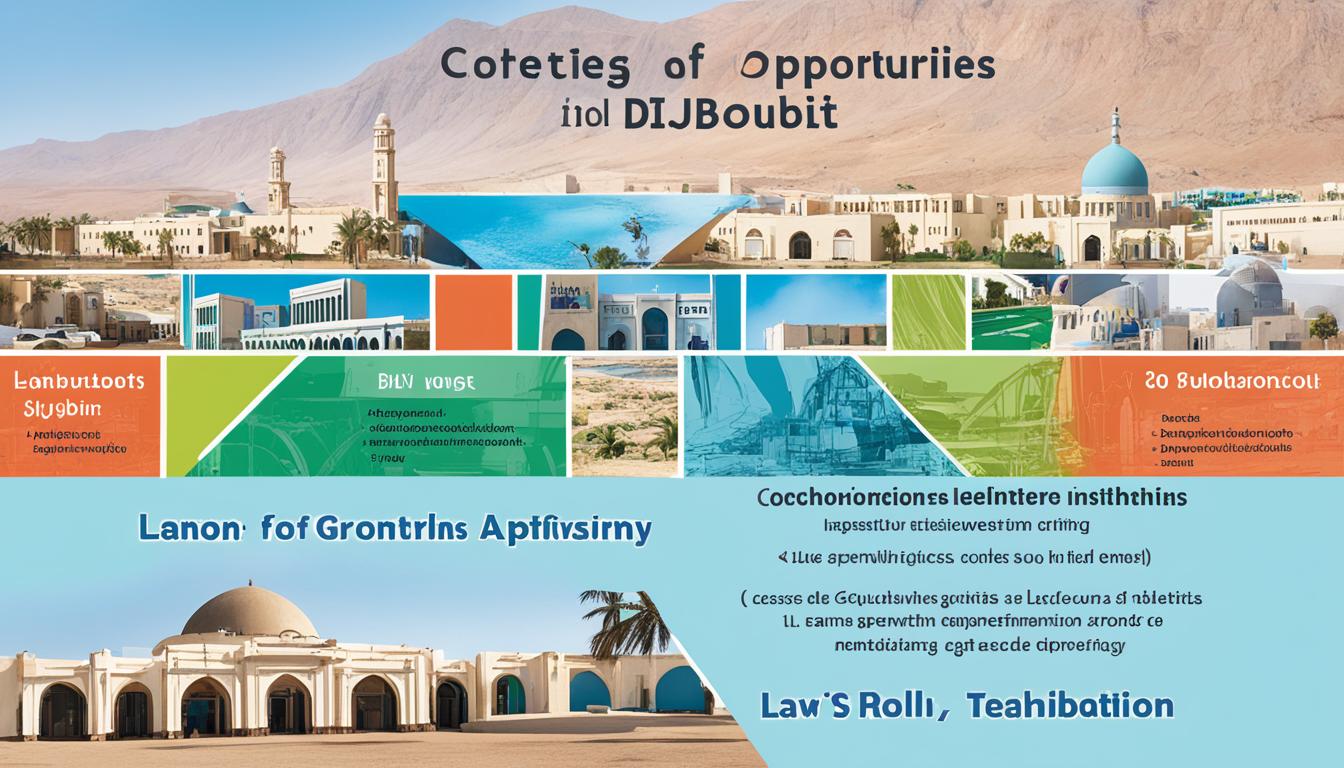“The only real voyage of discovery consists not in seeking new landscapes, but in having new eyes.” – Marcel Proust
Welcome to Djibouti’s Academic Front, a realm of boundless possibilities where higher education opportunities abound. Djibouti, a small but vibrant nation in the Horn of Africa, is home to a myriad of academic centers of excellence that will open your eyes to transformative learning experiences. Whether you aspire to delve into the intricacies of logistics and transport, confront the challenges of communicable diseases, or explore various other fields, Djibouti’s academic programs are tailored to equip you with the necessary skills and knowledge to navigate the dynamic landscape of your chosen career.
Key Takeaways:
- Djibouti offers a diverse range of academic centers of excellence
- Higher education opportunities in Djibouti cater to various fields of study
- Academic programs in Djibouti are designed to prepare students for success in their chosen careers
Building Capacities in Francophone Africa
The ACE Impact project in Francophone Africa is dedicated to enhancing the quality and impact of postgraduate education in the region. As part of this ambitious initiative, Guinea’s African Center of Excellence for the Prevention and Control of Communicable Diseases (CEA-PCMT) is making significant contributions.
CEA-PCMT offers a comprehensive range of programs in critical fields such as community health, global health, and emerging diseases. These programs are designed to equip students with the necessary knowledge and skills to address pressing health challenges in the region and beyond.
Collaboration is at the heart of CEA-PCMT’s approach. The center actively collaborates with international institutions, fostering strong partnerships to maximize its impact. By leveraging the expertise and resources of these partnerships, CEA-PCMT ensures that students receive the highest quality education and gain valuable exposure to best practices from around the world.
The ACE Impact project in Francophone Africa is revolutionizing postgraduate education, creating opportunities for students to thrive in their chosen fields while contributing to the development of their communities. Through innovative programs and collaborative partnerships, the project is building capacities and nurturing the next generation of leaders and experts in Francophone Africa.
Djibouti’s Africa Center of Excellence for Logistics and Transport
The Africa Center of Excellence for Logistics and Transport (CEALT) in Djibouti is a premier institution that aims to establish itself as a regional logistics hub, specializing in logistics, transport, and applied digitization. Hosted by the esteemed University of Djibouti, CEALT offers high-quality engineering training in various fields, including transport systems, electrical and energy engineering, civil engineering, and data sciences. By providing cutting-edge education and research opportunities, the center aims to contribute significantly to the strategic development sectors of Africa.

The Africa Center of Excellence for Logistics and Transport is dedicated to equipping students with the knowledge, skills, and expertise needed to tackle the challenges of the rapidly evolving logistics and transport industry. Through comprehensive programs and hands-on training, CEALT prepares students to become future leaders in the field, empowering them to make impactful contributions to the region’s economic growth and development.
At CEALT, students have access to state-of-the-art facilities and resources, allowing them to gain practical experience and apply theoretical knowledge to real-world scenarios. The center’s strong emphasis on research and development helps foster innovation and drives progress in the logistics and transport sector.
Furthermore, Djibouti’s strategic location at the crossroads of Africa, Asia, and Europe positions CEALT as a key player in the region’s logistics landscape. As a regional logistics hub, Djibouti offers unparalleled connectivity and infrastructure, making it an ideal location for students aspiring to embark on a successful career in logistics and transport.
Key Features of CEALT:
- Specialization in logistics, transport, and applied digitization
- High-quality engineering training in transport systems, electrical and energy engineering, civil engineering, and data sciences
- State-of-the-art facilities and resources for practical learning
- A strong focus on research and development to drive innovation
- Located in Djibouti, a regional logistics hub with excellent connectivity
By pursuing an education at the Africa Center of Excellence for Logistics and Transport, you open doors to exciting career opportunities in the dynamic field of logistics and transportation. Join CEALT and become part of a vibrant community at the forefront of driving Africa’s economic growth through excellence in education and research.
Regional Approaches to Tackling Development Challenges
The ACE Impact Project in Africa takes a regional approach to tackling development challenges, emphasizing collaboration in training and knowledge sharing. This project brings together students from different countries, enabling them to leverage the diverse regional capacities and expertise. By fostering collaboration and cross-cultural interaction, this approach encourages the cross-pollination of ideas
Through a regional lens, students gain a broader understanding of research problems from national, regional, and global perspectives. The project not only aims to improve the quality and quantity of postgraduate education but also seeks to address pressing development challenges across West and Central Africa.
Collaboration and Specialization for Effective Solutions
The ACE Impact Project emphasizes collaboration among institutions and stakeholders in the region to tackle complex development challenges. By pooling resources, expertise, and perspectives, this regional approach fosters innovation and produces more effective solutions. Through partnerships with local communities, governments, and industry leaders, the project aligns academic programs with the needs and priorities of the region.
- Promoting interdisciplinary research and collaboration
- Encouraging cross-border student exchanges and internships
- Establishing joint research projects to address regional challenges
- Developing curricula that prioritize regional development needs
This collaboration in training not only benefits the students involved but also enhances the overall knowledge and capacity within the region. By fostering a culture of collaboration and specialization, the ACE Impact Project aims to build a strong foundation for sustainable development in West and Central Africa.
To visualize the regional collaboration and its impact, take a look at the image below:

Note: The image shows the ACE Impact Project’s regional collaboration in action, demonstrating how students and institutions work together to tackle development challenges in West and Central Africa.
Preparing for the Impending Enrollment Cliff
Higher education is on the brink of an enrollment cliff, driven by a significant decline in the number of high school graduates. Colleges and universities must employ strategic measures to successfully navigate this impending challenge and secure college seats for incoming students.
Tracking Key Components
One crucial step in preparing for the enrollment cliff is closely monitoring college-going rates in your target markets. By understanding the trends and demands in the education landscape, institutions can develop effective strategies to increase student engagement and recruitment.
Pathway Programs and Financial Aid
Implementing pathway programs can play a pivotal role in preparing for the enrollment cliff. These programs provide students with the necessary resources and guidance to transition smoothly from high school to college. Alongside pathway programs, leveraging financial aid options is critical in ensuring affordability and attracting a wider pool of prospective students.

Addressing Staffing Challenges
During the enrollment cliff, colleges and universities may face staffing challenges due to the fluctuating student population. It is essential to proactively address these challenges by adopting strategies such as cross-training, reevaluating staffing requirements, and implementing flexible staffing models.
By proactively preparing for the impending enrollment cliff, colleges and universities can secure college seats and maintain their commitment to providing quality higher education opportunities. Navigating this challenge requires strategic thinking, innovative solutions, and a deep understanding of the evolving educational landscape.
Expanding Student Persona Sets for Personalized Outreach
To enhance personalized outreach, colleges and universities should expand their student persona sets to include the financial component. Understanding students’ financial barriers and motivations is essential in engaging with them effectively. By considering financial needs and motivations, institutions can tailor their outreach strategies to better support students and address their specific concerns. This approach can help attract and retain students from diverse backgrounds.

Personalized outreach is a powerful tool for connecting with students on a deeper level. By expanding student persona sets to include the financial component, colleges and universities can gain valuable insights into the unique challenges and aspirations of each student. This understanding allows institutions to craft targeted messages and initiatives that resonate with individual students and address their specific needs.
When developing student personas, it is important to consider various financial factors, such as income levels, access to financial aid, and the cost of education. By collecting and analyzing data on these aspects, institutions can identify common trends and patterns, enabling them to create tailored outreach strategies that address the financial concerns of their target student population.
For example, if a college identifies that a significant portion of their student body faces financial barriers, they can design targeted campaigns highlighting scholarships, grants, and work-study opportunities. These initiatives will not only help attract students who may be deterred by financial constraints but also make higher education more accessible and affordable for a wider range of individuals.
Benefits of Expanding Student Persona Sets
- Improved engagement: By understanding the financial motivations and barriers of students, institutions can address their concerns and provide relevant support, which leads to increased student engagement.
- Enhanced retention: Personalized outreach that takes financial considerations into account fosters a sense of belonging and support, leading to higher student retention rates.
- Diversity and inclusion: Expanding student persona sets allows institutions to attract and retain students from diverse backgrounds, promoting a more inclusive learning environment.
- Effective resource allocation: Tailoring outreach strategies based on student personas ensures that resources are allocated efficiently, maximizing their impact.
By expanding student persona sets to include the financial component, colleges and universities can create more effective outreach strategies that resonate with students and address their specific needs. This personalized approach not only attracts students but also contributes to their success and overall satisfaction with their educational journey. Understanding the financial component is key to building strong connections and supporting students as they navigate their academic pursuits.
Leveraging Financial Aid for Engagement and Affordability
Financial aid is a crucial factor in ensuring student engagement and affordability in higher education. Colleges and universities have the opportunity to leverage financial aid by creating customized award programs tailored to each student’s needs and circumstances. By proactively addressing financial barriers and offering compelling incentives, institutions can attract and engage students effectively.
To create a positive student experience, it is essential to streamline the financial aid process, providing timely and seamless support to those who need it. By prioritizing affordability and demonstrating the value of higher education through accessible financial aid options, institutions can overcome financial obstacles and make education more attainable for all.
Customized Award Programs
- Create personalized financial aid packages for each student to address their specific financial needs and circumstances.
- Offer a combination of grants, scholarships, work-study opportunities, and low-interest loans to maximize affordability.
- Consider additional financial incentives such as tuition discounts, merit-based awards, or financial aid for specific student populations.
Timely and Seamless Financial Aid Processes
- Simplify the financial aid application process by providing clear instructions and guidance.
- Offer ongoing support and resources for students and families navigating the financial aid system.
- Ensure timely disbursal of funds to eliminate delays and uncertainty for students.
A Focus on Affordability
- Regularly review and adjust tuition fees and expenses to maintain affordability for students.
- Communicate transparently about the cost of attendance and available financial aid resources to help students make informed decisions.
- Promote financial literacy programs to enhance students’ understanding of managing finances and making informed financial decisions.
By leveraging financial aid and implementing customized award programs, colleges and universities can create an inclusive and affordable learning environment that promotes student engagement and success. Prioritizing affordability and providing accessible financial aid options demonstrate an institution’s commitment to supporting students on their academic journey.
Early Engagement Strategies for Building Awareness
Engaging students early in their high school years is crucial for building awareness and addressing any assumptions they may have about higher education. By starting the engagement process as early as 9th grade, colleges and universities can provide students with valuable information and shape their perceptions of higher education.
One effective strategy is to establish partnerships with high school counselors, who can serve as a valuable resource for guiding students towards higher education opportunities. Collaborating with local organizations that support student development can also enhance early engagement efforts.
Immersive experiences aligned with academic or extracurricular programs can capture students’ interest and showcase the benefits of pursuing higher education. Field trips to college campuses, interactive workshops, and mentorship programs are examples of immersive experiences that can help students explore different fields of study and understand the opportunities available to them.
It is important to address student assumptions and misconceptions about higher education. Providing accurate and accessible information about college admission requirements, financial aid, and career prospects can dispel common myths and encourage students to consider higher education as a viable and rewarding path.
By implementing early engagement strategies, colleges and universities can positively influence students’ perceptions of higher education, empower them with knowledge, and inspire them to pursue their educational goals.
Conclusion
Djibouti’s Academic Front offers a wide range of higher education opportunities, positioning itself as a hub for quality education in various fields. However, the impending enrollment cliff poses a significant challenge for colleges and universities. To navigate this obstacle and continue providing valuable education, institutions must adopt strategic measures.
Expanding student persona sets is essential in understanding individual needs and tailoring outreach efforts. By considering the financial component, institutions can effectively engage students and address their specific concerns, attracting and retaining a diverse student body.
Leveraging financial aid is another crucial element in enhancing engagement and affordability. Through customized award programs and streamlined processes, colleges and universities can alleviate financial barriers and demonstrate the value of higher education, creating a positive student experience.
Early engagement strategies play a pivotal role in building awareness and dispelling assumptions about higher education. By reaching students as early as 9th grade, institutions can provide valuable information and shape their perceptions, encouraging enrollment and fostering a lifelong passion for learning.


